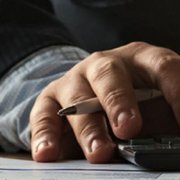How Witness Statements Can Strengthen Your Alabama Car Accident Case
The moments after a car accident are often chaotic and disorienting. Amidst the flashing lights, potential injuries, and damaged vehicles, one vital element can easily be overlooked: collecting witness statements. While your own account and the police report are important, independent witness testimony can often be the linchpin that strengthens your car accident claim, especially in a state like Alabama with its strict contributory negligence laws. These statements provide an unbiased perspective, offering clarity when details are hazy or when conflicting accounts arise.
What is a Witness Statement in a Car Accident Case?
A witness statement in a car accident case is an account provided by someone who observed the collision or its immediate aftermath. This individual is typically not directly involved in the accident (i.e., not one of the drivers or passengers in the involved vehicles). Their perspective is considered independent and objective, making their observations highly valuable.
Witness statements can take various forms:
- Verbal accounts: What a witness tells a police officer or an attorney at the scene.
- Written statements: A detailed account written and signed by the witness.
- Recorded statements: Audio or video recordings of the witness describing what they saw.
The content of a witness statement usually includes details such as:
- The date and time of the accident.
- The location of the accident.
- The movements of the vehicles involved.
- Observations about driver behavior (e.g., speeding, distracted driving).
- Details about road conditions, weather, or other environmental factors.
- Observations about the impact and immediate aftermath.
Why Are Witness Statements So Important in Alabama?
Witness statements hold significant weight in Alabama car accident cases for several reasons:
- Corroborating Evidence: They can support your version of events, lending credibility to your claim. When your account aligns with an independent witness’s observations, it builds a stronger narrative of how the accident occurred.
- Establishing Fault: In Alabama, determining who was at fault is extremely important due to the state’s pure contributory negligence rule. This law states that if you are found even one percent responsible for the accident, you are barred from recovering any damages. A neutral witness can provide critical details that pinpoint the other driver’s negligence and help counter any claims that you contributed to the collision.
- Dispute Resolution: When drivers offer conflicting accounts of an accident, witness statements can be invaluable in resolving disputes. They offer an unbiased perspective that can help clarify ambiguities and sway the perception of what truly happened.
- Overcoming Insurance Company Tactics: Insurance companies often look for reasons to deny or minimize claims. If their insured driver disputes liability, a solid witness statement can provide objective proof of fault, making it harder for the insurer to reject your claim.
- Memory Fades: Memories can fade quickly after a traumatic event. A statement taken shortly after the accident preserves crucial details that might otherwise be forgotten by those involved.
- Unbiased Perspective: Unlike the involved parties, witnesses typically have no vested interest in the outcome of the claim. This impartiality makes their testimony particularly compelling to insurance adjusters, judges, and juries.
Who Can Be a Witness to a Car Accident?
A car accident witness is generally anyone who saw some aspect of the incident. This can include:
- Drivers or passengers in other vehicles: Those who were driving nearby and observed the collision.
- Pedestrians or cyclists: Individuals walking or biking in the vicinity.
- Residents or business owners: People who live or work near the accident scene and may have seen or heard something relevant.
- Bystanders: Anyone present at the scene, even if they were just passing by.
It is important to consider all potential sources of witnesses. Sometimes, a person may not have seen the exact impact but observed reckless driving leading up to it, or they might have heard the sound of the collision and then seen the immediate aftermath, including the positions of the vehicles or the behavior of the drivers.
What Information Should You Collect from a Witness?
If you are able to safely do so at the accident scene, collecting specific information from witnesses is highly advisable:
- Contact Information: This is the most important detail. Obtain their full name, phone number, and email address. You will need to contact them later for a detailed statement.
- Brief Account: Ask them what they saw. Encourage them to provide a concise summary of the events as they remember them. Do not try to influence their statement.
- Perspective: Ask where they were located when they observed the accident. This helps to establish the reliability and angle of their view.
- Willingness to Help: Confirm if they are willing to provide a formal statement later or testify if necessary.
- Any Identifying Details: Note down any unique features about the witness if you don’t have their name, such as their clothing, vehicle, or a general description, which might help if you need to locate them later.
Remember to be polite and thank them for their time. Focus on getting their contact information so a professional can follow up.
What if I Didn’t Get Witness Information at the Scene?
It is common for individuals not to obtain witness information at the accident scene, especially if they are injured or disoriented. If you did not collect witness details, there are still avenues to explore:
- Police Report: The investigating police officer may have spoken with witnesses and included their contact information or statements in the official accident report. Obtaining a copy of this report is a priority.
- Area Canvassing: Your legal team can visit the accident location to speak with nearby residents or businesses who might have seen the accident or have surveillance cameras that captured the event.
- Social Media: Sometimes, people will post about accidents they witnessed on local community social media groups. While this is less reliable, it can occasionally lead to identifying a witness.
- Property Surveillance: Many businesses and homes have security cameras. Your attorney can investigate whether any nearby cameras might have recorded the incident.
- Dashcam Footage: Other drivers might have dashcam footage that captured the accident. While you might not know who they are, police may be able to identify vehicles from the scene that could have had cameras.
While finding witnesses after the fact can be challenging, it is not impossible. A thorough investigation can often uncover individuals who can provide valuable testimony.
How a Legal Team Helps Secure and Utilize Witness Statements
Securing impactful witness statements and effectively using them in a car accident claim is a multi-faceted process that benefits greatly from legal assistance. Here’s how experienced legal professionals can help:
- Prompt Investigation: An attorney can act quickly to identify and contact witnesses before their memories fade or they become difficult to locate. This often involves revisiting the accident scene, reviewing police reports, and conducting interviews.
- Formal Statement Collection: Legal teams know how to properly interview witnesses and obtain formal, legally admissible statements. This includes drafting written statements for signature, or arranging for recorded or transcribed depositions when appropriate. They ensure the statements are comprehensive and focus on key details relevant to liability.
- Assessing Credibility: Not all witness accounts are equally useful. A legal professional can assess the credibility of a witness, considering factors like their vantage point, potential biases, and consistency of their account.
- Handling Reluctant Witnesses: Sometimes, witnesses are hesitant to get involved. An attorney can explain the importance of their testimony and reassure them about the process, often encouraging them to cooperate where they might otherwise decline.
- Integrating Statements into the Case: Witness statements are just one piece of the puzzle. A skilled legal team integrates these statements with other evidence, such as police reports, photographs, medical records, and accident reconstruction analysis, to build a cohesive and compelling argument for liability and damages.
- Preparation for Negotiation and Trial: Witness statements are powerful tools in settlement negotiations. They provide leverage against insurance companies that might otherwise dispute fault. If a case proceeds to trial, witnesses can provide crucial testimony to a judge or jury. Attorneys prepare witnesses for potential testimony, ensuring they understand the process and can articulate their observations clearly.
Car Accident in Alabama? Act Now to Protect Your Rights.
When you are dealing with the aftermath of a car accident, especially one that has caused significant injuries, the legal landscape can be daunting. Alabama’s contributory negligence rule means that any misstep in proving fault can jeopardize your entire claim. A knowledgeable personal injury attorney will understand the nuances of Alabama accident law. Get in touch with an attorney as soon as possible to ensure that your rights are protected and you fully understand your legal options.













Leave a Reply
Want to join the discussion?Feel free to contribute!